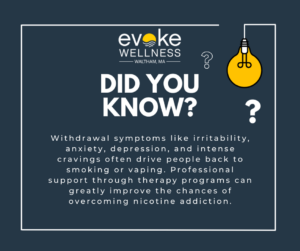You’re interested in learning more about nicotine and its effects on the body and mind. Evoke Wellness at Waltham can give you insight on increasing your understanding of this complex substance. We’ll explore whether nicotine acts as a stimulant, look at statistics on nicotine use, and learn about therapeutic therapy programs that can help people recover from nicotine addiction.
- Topic covered: Whether nicotine is a stimulant, its effects, and the dangers of nicotine use.
- Key insights: Nicotine has both stimulant and depressant properties. It causes short-term effects like increased heart rate and alertness, but also long-term impacts on brain chemistry and addiction. Nicotine use is highly addictive and harmful to overall health.
- Takeaway: Given its addictive nature and negative consequences, nicotine should be avoided. Various evidence-based therapy programs can help individuals overcome nicotine addiction.
Call us at (833)-287-7223 today or reach out online.
Is Nicotine a Stimulant or Depressant?
Nicotine is a complex substance with both stimulant and depressant effects. Initially, it acts as a stimulant by causing a spike in blood pressure, heart rate, and the release of glucose from the body’s stores. This “kick” results from nicotine’s ability to trigger adrenaline release.
However, as levels of nicotine start to drop in the bloodstream, it begins producing depressant effects. The feelings of relaxation and calmness associated with nicotine consumption come from its suppression of motor activity and anxiety relief properties. This duality contributes to nicotine’s highly addictive nature.
The stimulant versus depressant question underscores how nicotine impacts the brain’s reward pathways. Understanding this mechanism is crucial for those seeking to break free from nicotine addiction through our evidence-based therapy programs like EMDR, trauma therapy, dual diagnosis treatment, and acceptance and commitment therapy.
Short-Term Effects of Nicotine Use
Nicotine is a powerfully addictive stimulant that acts quickly on the brain and body. Upon ingesting nicotine, you may experience an almost immediate “kick” or rush of adrenaline.
1. Increased Alertness
Within 10 seconds of inhaling from a cigarette, nicotine reaches your brain and causes a spike in blood pressure, breathing rate, and heart rate. This leads to a temporary feeling of heightened alertness and arousal.
2. Improved Mood
Nicotine also triggers a release of dopamine and other neurotransmitters that regulate mood and pleasure pathways. This produces a brief sense of relaxation and improved mood.
3. Addictive Effects
However, as nicotine levels quickly drop, unpleasant withdrawal symptoms like irritability, anxiety, and cravings set in – fueling the cycle of nicotine addiction. Over time, this leads to physical and psychological dependence.
Long-Term Effects of Nicotine
Extended nicotine exposure has been linked to several adverse effects on health. Long-term smoking substantially increases the risk of developing various cancers, particularly lung, throat, and mouth cancers.
Chronic nicotine use also puts a significant strain on the cardiovascular system. It raises blood pressure, accelerates atherosclerosis (hardening of arteries), and heightens the risk of heart attacks and strokes.
Nicotine Addiction
Perhaps the most troubling long-term effect is nicotine’s highly addictive nature. Over time, users develop a physical and psychological dependence, making it extremely difficult to quit.
Signs of Nicotine Addiction
Nicotine is an addictive substance that can lead to physical and psychological dependence over time. Some common signs of nicotine addiction include:
1. Intense Cravings
One telltale sign is experiencing intense, frequent cravings or urges to use nicotine. These cravings can be both physical and mental.
2. Increased Tolerance
Needing to consume more nicotine over time to achieve the desired effects is a key indicator of growing tolerance and potential addiction.
3. Withdrawal Symptoms
Feeling irritable, anxious, restless or depressed when going without nicotine for too long points to nicotine withdrawal and dependence.
4. Difficulty Quitting
Despite a desire to stop using nicotine products, an inability to successfully quit for an extended period is a common struggle with addiction.
Being aware of these warning signs can help motivate getting support through professional addiction treatment programs before more severe consequences arise. Early intervention gives the best chance at overcoming nicotine’s powerful grip.
Nicotine Withdrawal
Quitting nicotine can lead to withdrawal symptoms. As your body rids itself of the drug, you may experience intense cravings, irritability, anxiety, depression, restlessness, trouble concentrating, increased appetite and insomnia.
How Long Does It Last?
The first few days are usually the worst. Symptoms typically peak around the third day of quitting and can last a few weeks for most people. However, cravings and other side effects can persist for months in some cases.
Coping Strategies
Nicotine withdrawal is temporary but intense. Several techniques like exercise, staying hydrated, getting enough rest and joining a support group can help manage symptoms. Medications and nicotine replacement therapy may also ease cravings. With commitment and professional help if needed, you can overcome this challenge.
Get Help at a Nicotine Rehab
If you’re struggling with nicotine addiction, seeking professional help at a reputable nicotine rehab center can greatly increase your chances of success. These programs offer comprehensive treatment plans tailored to your unique needs, combining evidence-based therapies like EMDR, reality therapy, trauma therapy, dual diagnosis treatment, and acceptance and commitment therapy.
Personalized Treatment Plans
At a nicotine rehab, you’ll work closely with addiction specialists to develop a personalized treatment plan that addresses the root causes of your addiction and any dual-diagnosis health issues. This holistic addiction therapy approach ensures you receive the support and tools necessary for long-term recovery.
Supportive Environment
Rehab centers provide a safe, supportive environment free from the triggers and stressors of daily life, allowing you to focus solely on your recovery. You’ll be surrounded by others on a similar journey, fostering a sense of community and accountability.
Aftercare and Relapse Prevention
Recovery is an ongoing process, and nicotine rehabs understand this. They offer robust aftercare programs and relapse prevention strategies to help you maintain your progress and navigate challenges after completing the initial treatment phase.
FAQ: Is Nicotine a Stimulant Like Caffeine?
Nicotine and caffeine are often grouped together as stimulants. However, there are some key differences between the two substances.
Is Nicotine a Stimulant?
Technically, nicotine is a stimulant drug that speeds up the activity of the brain and central nervous system. Like caffeine, it increases alertness and concentration in the short term. However, nicotine is significantly more addictive and harmful than caffeine in the long run.
How Does Nicotine Differ from Caffeine?
While both substances provide an energy boost, nicotine has more severe physical and psychological effects:
- Nicotine is the primary addictive component in tobacco products. Over time, it creates dependence and withdrawal symptoms.
- Nicotine increases heart rate and blood pressure more dramatically than caffeine.
- Nicotine has been linked to higher risks of lung disease, heart disease, and cancer when used long-term.
So while nicotine and caffeine share some stimulant properties, nicotine poses much greater health risks with its addictive nature and negative physiological impacts over time. Moderation is key for caffeine, while nicotine should be avoided entirely if possible.
Conclusion
In summary, nicotine is considered a stimulant drug that activates the pleasure centers of the brain. While it may provide temporary benefits, chronic nicotine use carries serious health risks. Quitting can be very challenging due to the addictive nature of nicotine, but with the right treatment program, long-term abstinence is possible. As covered in this article, some of the most effective options include cognitive behavioral therapy, trauma therapy, dual diagnosis treatment, and nicotine replacement products. By understanding both the short-term effects and long-term dangers of nicotine, you can make informed decisions and get help if needed. The key is to avoid underestimating the power of this addictive substance. With support and perseverance, you can take control and live a healthier, nicotine-free life.
Begin Your Journey with Evoke Wellness at Waltham
If you or a loved one is considering outpatient treatment, Evoke Wellness at Waltham invites you to contact us. Our compassionate team is ready to answer your questions, discuss your needs, and help you take the first steps toward recovery. At Evoke Wellness, you will find more than just a treatment program – you’ll discover a community dedicated to your wellness and success. Together, let’s embrace the journey to recovery and the promise of a new beginning. Call us at (833)-287-7223 today or reach out online.



